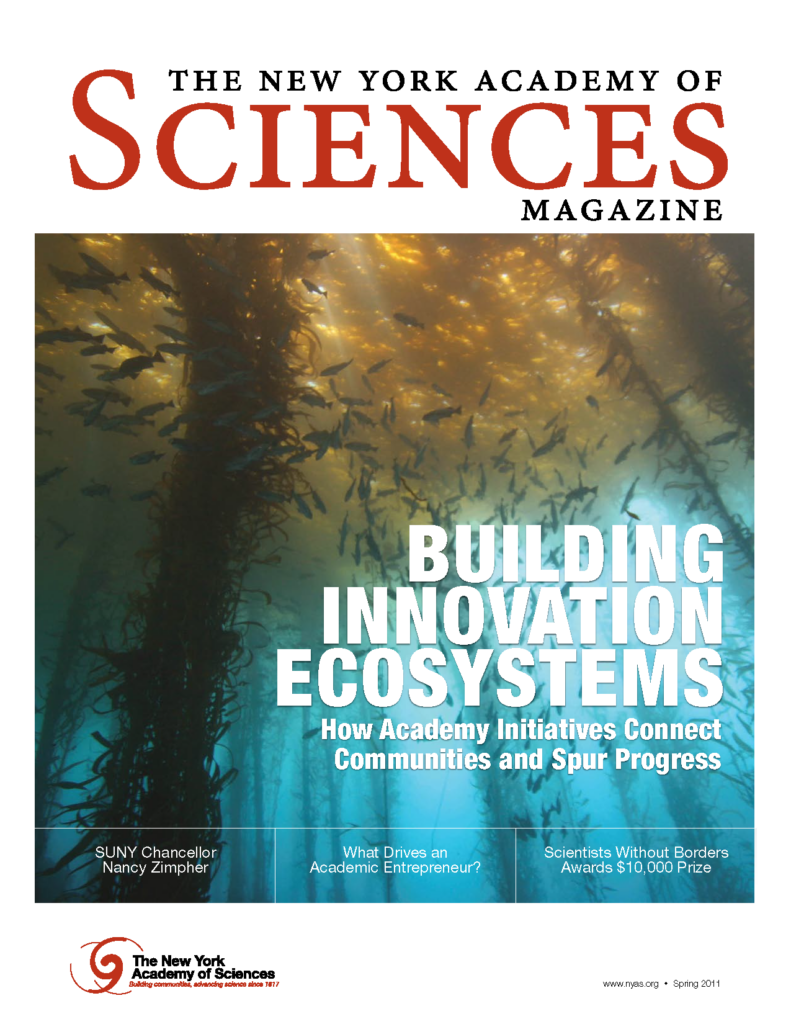What Drives an Academic Entrepreneur?
Technology commercialization offers an attractive proxy for policymakers interested in innovation and economic development.
Published May 1, 2011
By Christopher S. Hayter
Academy Contributor

As the developed world continues its slow climb out of the financial crisis, policymakers and companies increasingly look to research universities to generate new ideas and to contribute to innovation and economic development. Academic entrepreneurship—the formation of companies based on intellectual property generated by faculty members—is of particular interest given the publicized success of companies such as Lycos from Carnegie Mellon University and Silicon Graphics and Genentech from Stanford.
The recent and rapid growth of spinoffs is promising. According to the Association of University Technology Managers, the number of companies spun out of universities in the U.S. more than doubled between 1996 and 2005—from 200 to nearly 450. Research shows that these companies are not only more likely to attract venture capital and have an initial public offering, but, compared to non-university startups, they also have a higher propensity to survive over time. Consequently, numerous universities have created incubators, venture funds, and other programs to encourage spinoff establishment and growth.
While these developments are important, recent research exploring the motivations and growth aspirations of university academic entrepreneurs is cause to moderate our expectations of spinoffs for economic development.
Entrepreneurial Motivation and Ambition
Traditional economics research typically assumes that economic incentives—the so-called profit motive—are the primary reason why entrepreneurs establish and operate new companies. However, in the early 1970s a number of studies showed that individuals establish companies for multiple, interrelated, and non-financial reasons. For example, in surveys among female entrepreneurs in the 1990s, respondents were primarily motivated to establish a company for personal fulfillment, the desire to help others, and the flexibility to spend more time with their family.
Similar, albeit fewer, studies also examine the “growth ambitions” of entrepreneurs, asking, “to what extent do entrepreneurs make the choice to grow their company (or not)?” These studies also find that many entrepreneurs purposely do not grow their business in order to enjoy other, non-financial benefits of entrepreneurship such as independence and flexibility.
Very little research exists relating to the motivations and growth ambitions of academic entrepreneurs. A forthcoming article in the June edition of the Journal of Technology Transfer, a peer-reviewed scholarly publication relating to knowledge dissemination and commercialization, summarizes a year-long research project funded by the Ewing Marion Kauffman Foundation. The project sought to understand why academic entrepreneurs within public universities across the United States establish their companies and their (post-establishment) definitions of success.
University research is far removed from the market and typically requires extensive development. Government and university leaders often assume that spinoffs are established to develop and commercialize this technology. The research project finds that the motivations and growth aspirations of nascent academic entrepreneurs are myriad and not solely focused on commercialization or financial gain.
Definitions of Success
Academic entrepreneurs in the sample were motivated to establish their business primarily as a vehicle to disseminate the results of their research beyond publication. As one respondent explained, “We are trying to get our technology out of the university.” Another unique faculty motivation for entrepreneurship is the in-fluence of peers both within and outside a university. In addition to supportive faculty colleagues, professional managers, funders, technical assistance providers, and others provided influence.
Other motivations mirrored faculty definitions of success. These areas include technology development, personal financial gain, public service, career enrichment, job creation, and skill enhancement. Academic entrepreneurs in the sample are certainly interested in financial gain but, unlike profit-maximizing actors, money is not their primary goal. They often see financial gain as compensation for the time they spend away from their academic jobs as opposed to an end in itself.
Interestingly, responses relating to technology development provide a more nuanced understanding of how academic entrepreneurs view spinoff success. One group of academic entrepreneurs describes “technology development” as an immediate emphasis on technology commercialization and the resources needed to do so. The other group describes it as a singular pursuit of funding not available within the university. Specifically, they see their spinoff as a platform for consulting and access to government grants, especially SBIR awards, but did not see a need for pursuing commercialization.
To be sure, building business systems and commercializing technology are complex endeavors subject to multiple internal and external factors. But related to the ambitions of academic entrepreneurs, it is important for policymakers to understand that many of the individuals in the study have little short-term interest in commercializing their technology.
Implications for Policy
These findings do not diminish the actions of academic entrepreneurs uninterested in profit or rapid enterprise growth. After all, most of these individuals are productive public servants who attempt to balance the demands of establishing a company with their teaching, research, community service, and other faculty responsibilities within their respective non-profit educational institutions. However, these findings do hold important implications for spinoff support policies and programs that seek to spur economic development and job creation.
While recent policy discussions highlight the challenges of attracting seed and venture capital, recruiting experienced, competent managers, and commercializing their technology, perhaps the most basic considerations are the motivations and ambitions of faculty entrepreneurs. It may be unrealistic to understand the motivations of academics in the early phases of spin-off. However, among multiple entrepreneurial motivations and definitions of success, technology commercialization offers an attractive proxy for policymakers interested in innovation and economic development.
Christopher S. Hayter previously served as a visiting lecturer in public policy at the United States Coast Guard Academy. He holds a PhD in economics and technology policy from the George Washington University.
This story originally appeared in the Spring 2011 issue of The New York Academy of Sciences Magazine.
Also read: What Happens When Innovative Scientists Embrace Entrepreneurship?

